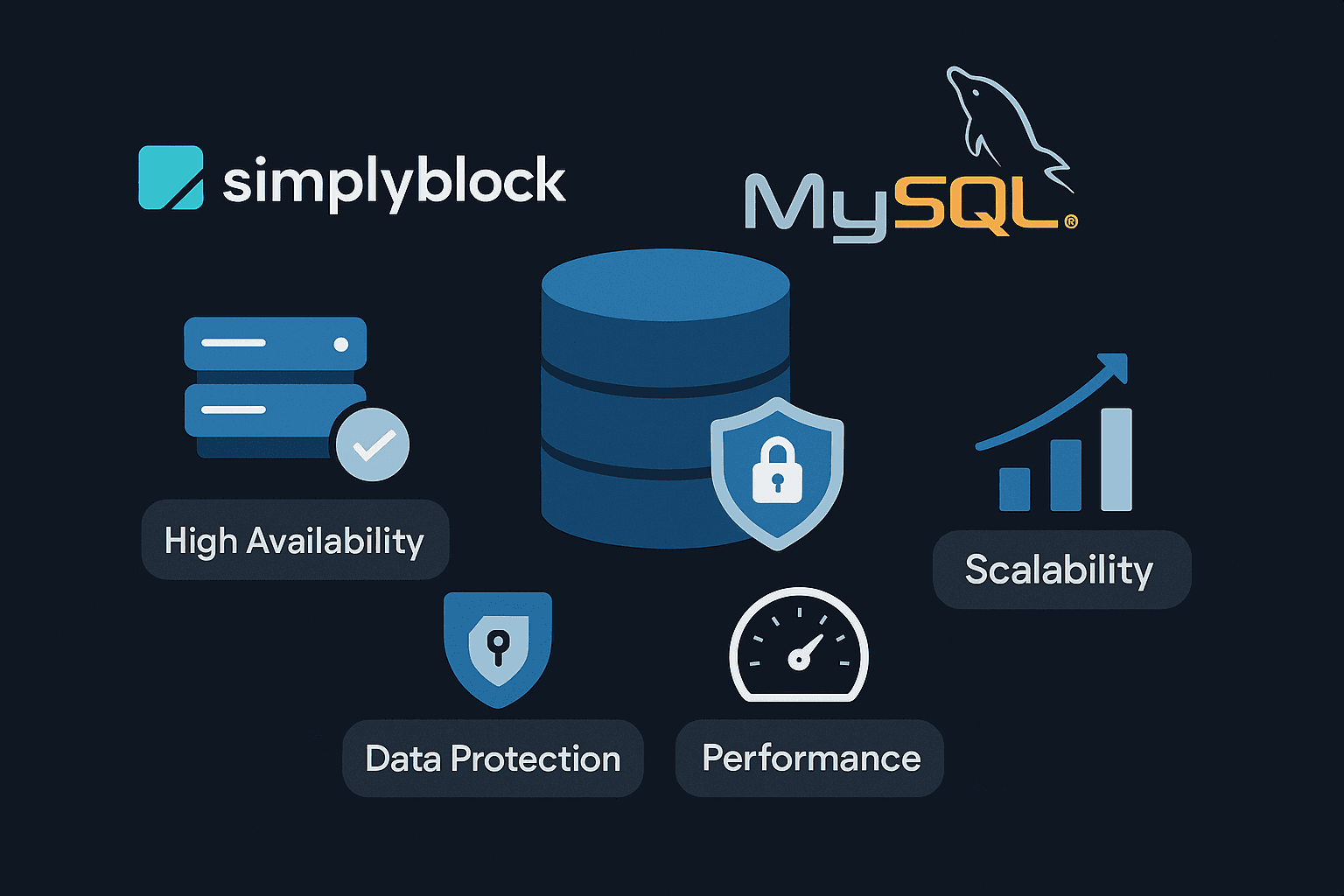MySQL is one of the most widely adopted relational databases, used for a range of applications, from small to enterprise-level workloads. It is reliable, but its performance depends on the efficiency of the storage layer. Slow storage can cause replication lag, longer query times, and issues with backups.
Simplyblock provides NVMe-over-TCP storage and zone-independent volumes, ensuring MySQL remains fast, durable, and easy to scale across clusters.
Why MySQL Storage Needs Optimization
MySQL relies on the InnoDB storage engine, which uses redo logs, doublewrite buffers, and background flush operations. If the storage cannot keep up, replication slows, transactions stall, and recovery after crashes takes longer.
By using simplyblock, MySQL places its data files and logs on high-throughput, zone-independent storage. This keeps replication consistent and helps databases maintain predictable response times.
🚀 Use simplyblock with MySQL for Reliable Transactions
Simplyblock ensures MySQL deployments can scale without storage bottlenecks.
👉 Use simplyblock for Amazon EKS →
Step 1: Creating a Simplyblock Volume for MySQL
Provision a dedicated simplyblock volume for MySQL data files:
sbctl pool create mysql-pool /dev/nvme0n1
sbctl volume add mysql-data 150G mysql-pool
sbctl volume connect mysql-data
Format and mount the volume:
mkfs.ext4 /dev/nvme0n1
mkdir -p /var/lib/mysql
mount /dev/nvme0n1 /var/lib/mysql
Persist the mount in /etc/fstab:
/dev/nvme0n1 /var/lib/mysql ext4 defaults 0 0
With this setup, MySQL data and log files are stored directly on simplyblock volumes, ensuring efficient operation for write-intensive workloads.

Step 2: Configuring MySQL to Use Simplyblock
Point MySQL to the simplyblock-backed directory:
In /etc/my.cnf:
[mysqld]
datadir=/var/lib/mysql
innodb_flush_method=O_DIRECT
innodb_log_file_size=1G
Restart MySQL:
sudo systemctl restart mysqld
This ensures InnoDB’s writes and redo logs are stored on high-throughput simplyblock volumes. More details are available in the MySQL InnoDB configuration guide.
Step 3: Expanding Storage for MySQL Tables
As MySQL workloads expand, tables, indexes, and binary logs may outgrow the initial volume. Scale volumes without downtime:
sbctl volume resize mysql-data 300G
resize2fs /dev/nvme0n1
This scaling ability allows MySQL to handle growing transactional systems. In distributed environments, it works well with OpenStack integration.
Step 4: Zone Independence in MySQL Clusters
MySQL replication and clustering often span multiple zones. Standard storage tied to one zone makes failovers difficult.
Simplyblock provides zone-independent volumes, keeping MySQL replicas connected to storage even during rescheduling across zones.
This supports high availability strategies similar to Talos-based environments.
Step 5: Replicating MySQL Data with Simplyblock
MySQL provides replication at the database level, but simplyblock adds storage-level replication for extra durability:
sbctl volume replicate mysql-data –zones=zone-a,zone-b
This setup minimizes downtime and data loss during failures. Replication concepts are explained further in the MySQL replication documentation.
MySQL Growth Supported by Simplyblock Storage
At enterprise scale, MySQL requires both predictable performance and simple operations. Simplyblock makes this easier with CLI-driven provisioning, resizing, and replication.
Features such as Rancher by SUSE support extend deployment flexibility, while administrators can reference the simplyblock Documentation.
Other supported platforms
If you’re running relational or MySQL-compatible database workloads alongside MySQL, Simplyblock also strengthens storage for:
Questions and Answers
Simplyblock accelerates MySQL workloads with NVMe-over-TCP storage, reducing latency and boosting IOPS. This results in faster query execution, improved transaction handling, and consistent performance under heavy workloads.
Yes, simplyblock integrates seamlessly with Kubernetes through its CSI driver, delivering persistent NVMe volumes for MySQL. Its RTO and RPO reduction features help ensure fast recovery and minimal downtime for database workloads.
Absolutely. Simplyblock provides synchronous replication, encryption-at-rest, and instant snapshots to support MySQL high-availability clusters, ensuring enterprise-grade durability and compliance.
Unlike standard cloud disks, which often suffer from variable performance, simplyblock offers predictable low latency and throughput. Its Kubernetes backup capabilities also provide a more resilient option for MySQL persistence in containerized environments.
Simplyblock ensures MySQL workloads run consistently across on-premises, private cloud, and public cloud setups. With NVMe-grade storage, it simplifies scaling while maintaining predictable performance and data protection.

